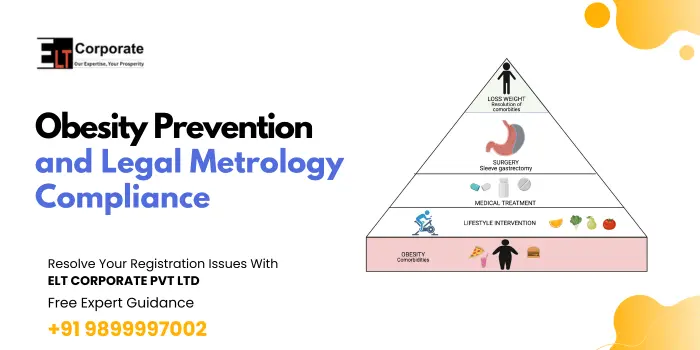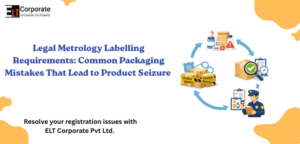Obesity Prevention Initiatives and Legal Metrology Compliance are closely linked because packaged foods and beverages directly impact public health. Obesity is rising in India due to unhealthy diets, processed food consumption, and misleading advertisements. To tackle this, Legal Metrology laws and food labeling rules make it mandatory for companies to provide clear, correct, and complete information on product labels. This ensures that consumers can make healthier choices, helping in obesity prevention.
Legal Metrology compliance works hand-in-hand with FSSAI regulations to stop misleading claims, regulate portion sizes, and provide nutritional transparency. Together, they protect consumers from being misled and support obesity control programs.
What does Obesity Prevention Initiatives and Legal Metrology Compliance mean?
Obesity Prevention Initiatives and Legal Metrology Compliance mean applying food laws and packaging rules to promote healthy eating.
- Obesity Prevention Initiatives focus on reducing obesity through awareness, labeling, and regulating unhealthy food practices.
- Legal Metrology Compliance ensures that packaged foods show accurate weight, nutritional value, price, and health claims.
Together, they make sure consumers are not cheated and have reliable information to make healthier choices.
Why are Obesity Prevention Initiatives and Legal Metrology Compliance important for public health and consumer protection?
Obesity Prevention Initiatives and Legal Metrology Compliance are important because they:
- Protect consumers from false nutritional claims.
- Ensure foods display accurate calorie and sugar levels.
- Help people make informed food choices to reduce obesity.
- Support government efforts in fighting lifestyle diseases like diabetes and heart disease.
Without these measures, consumers may buy products with hidden sugars, fats, or misleading “healthy” labels, which worsen obesity problems.
Which authorities regulate Obesity Prevention Initiatives and Legal Metrology Compliance in India?
The main authorities are:
- Legal Metrology Department – Ensures correct declarations on packaged products under the Legal Metrology (Packaged Commodities) Rules, 2011.
- FSSAI (Food Safety and Standards Authority of India) – Regulates nutrition labeling, calorie display, and food safety standards.
- Ministry of Consumer Affairs – Oversees consumer protection in labeling and packaging.
How does food labeling under Legal Metrology help in Obesity Prevention Initiatives?
Food labeling under Legal Metrology helps by:
- Making it mandatory to show net quantity, price, and nutritional content.
- Preventing misleading packaging like false “sugar-free” or “fat-free” claims.
- Helping consumers compare products and choose healthier options.
- Supporting government campaigns like “Eat Right India” by FSSAI.
How do misleading claims affect Obesity Prevention Initiatives and Legal Metrology Compliance?
Misleading claims can harm both obesity prevention and compliance by:
- Misguiding consumers with “low-fat” or “natural” tags without proof.
- Promoting products high in sugar/salt as “healthy.”
- Creating false trust in processed foods, increasing obesity risk.
- Violating both FSSAI and Legal Metrology labeling rules, leading to penalties.
What role does FSSAI play along with Legal Metrology in Obesity Prevention Initiatives?
FSSAI works together with Legal Metrology in the following ways:
- Mandating nutritional labeling (calories, sugar, fat).
- Introducing Front-of-Pack (FoP) labeling to highlight high sugar, salt, or fat.
- Running health campaigns like Eat Right Movement.
- Monitoring misleading food advertisements.
This partnership ensures consumer health protection and supports obesity prevention programs.
What are the challenges faced by businesses in following Obesity Prevention Initiatives and Legal Metrology Compliance?
Businesses face several challenges, such as:
- Constantly changing rules for nutrition and labeling.
- High compliance cost for reformulating products.
- Risk of penalties for even small labeling mistakes.
- Lack of awareness among small FMCG players.
How does strict Legal Metrology Compliance support healthier consumer choices in Obesity Prevention Initiatives?
Strict compliance ensures that:
- Every product shows real and accurate nutritional facts.
- Junk foods cannot hide harmful contents like trans fats and sugars.
- Consumers can compare products easily and choose low-calorie or low-salt options.
- Overall, it pushes businesses to make healthier food products.
Why is professional consultancy important for companies to manage Obesity Prevention Initiatives and Legal Metrology Compliance effectively?
Professional consultancy helps companies by:
- Preparing error-free labeling and packaging.
- Keeping businesses updated with latest FSSAI and Legal Metrology rules.
- Preventing penalties, product recalls, and delays.
- Helping businesses design consumer-friendly labels that meet compliance.
This ensures smooth compliance and builds long-term trust with consumers.
What happens if a company does not follow Legal Metrology rules in food labeling?
They may face penalties, product bans, and even legal action.
How does Legal Metrology compliance help in obesity prevention?
It ensures that consumers get clear and accurate food information to make healthier choices.








